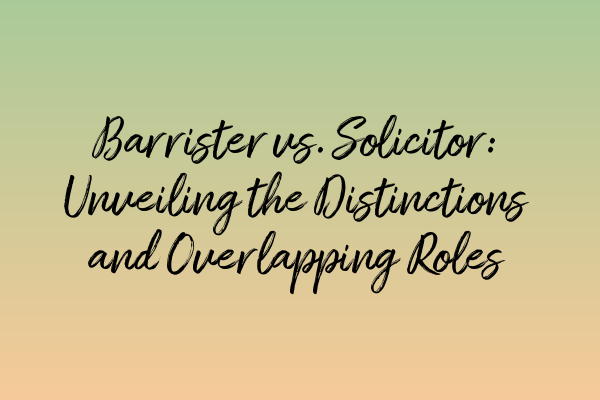**Barrister vs. Solicitor: Unveiling the Distinctions and Overlapping Roles**
In the legal field, there are two primary professional roles that often come up in discussions: barrister and solicitor. While both roles are essential to the functioning of the legal system, they have distinct responsibilities and play unique roles in the legal process. In this blog post, we will delve into the distinctions and overlapping roles of barristers and solicitors, shedding light on their respective contributions to the legal profession.
**What is a Barrister?**
To begin, let’s explore the role of a barrister. Barristers are specialist advocates who are trained to represent clients in court. They have expertise in researching, advising, and presenting arguments in a courtroom setting. Think of them as the legal experts who specialize in oral advocacy and litigation.
One of the key attributes of a barrister is their ability to provide independent, objective advice to their clients. They offer legal opinions on the merits of the case, identify legal issues, and devise appropriate legal strategies. Barristers often work in collaboration with solicitors, who act as intermediaries between them and the clients.
**What is a Solicitor?**
Now, let’s turn our attention to the role of a solicitor. Solicitors are legal professionals who primarily handle non-litigation matters, such as providing legal advice, drafting legal documents, and negotiating settlements. They are the client-facing representatives who manage the overall legal process, including gathering evidence, interviewing witnesses, and liaising with barristers when necessary.
Solicitors play an integral role in legal transactions, such as property conveyancing, will writing, and contract negotiations. They act on behalf of the clients to ensure compliance with legal requirements and offer guidance on potential legal pitfalls. Their broad-based legal knowledge allows them to handle diverse legal areas and provide comprehensive advice to clients.
**Overlapping Roles**
Although barristers and solicitors have distinct roles, there are instances where their responsibilities overlap. One such example is when solicitors instruct barristers to represent clients in court proceedings. In this scenario, solicitors collaborate with barristers to prepare the case, gather evidence, and engage in strategic planning.
Another area of overlapping roles can be seen in the advisory capacity. While barristers are well-known for their expertise in providing legal advice on complex legal issues, solicitors also offer valuable advice to their clients. Solicitors often tackle the initial legal queries and concerns of clients, providing them with guidance on how to proceed and when to seek the assistance of a barrister.
**Choosing the Right Legal Professional**
So, how do you determine whether you need the services of a barrister or a solicitor? The decision generally depends on the nature of your legal matter. For example, if you require representation in court or need advice on complex legal questions, it may be beneficial to consult a barrister. On the other hand, if you are seeking general legal advice, assistance with contracts, or assistance with transactional matters, a solicitor may be the right choice.
Ultimately, the decision of choosing between a barrister and a solicitor depends on your unique legal needs and circumstances. Whether you require courtroom representation or legal guidance, there are legal professionals who can cater to your specific requirements.
**Conclusion**
In summary, barristers and solicitors both play crucial roles in the legal profession. Barristers excel in courtroom advocacy, while solicitors specialize in providing comprehensive legal advice and managing non-litigation matters. While their roles may overlap in certain situations, understanding the distinctions between the two can help you make an informed decision when seeking legal assistance.
If you would like further information on specific legal topics, we recommend checking out the following related articles:
– SQE Prep: Tips and Tricks to Excel in Criminal Law
– Cross-Examination Techniques: Mastering the Art of Questioning
– Private Prosecutions: Exploring Non-Governmental Prosecutions in Criminal Cases
– Ethical Challenges in Criminal Defence: Navigating Dilemmas
– Assault and Battery Laws: Understanding the Legal Parameters
Remember, when facing legal issues, it is always advisable to seek professional legal guidance. By consulting with the right legal professional, you can ensure that your rights are protected and your legal matters are handled proficiently.


Leave a Reply